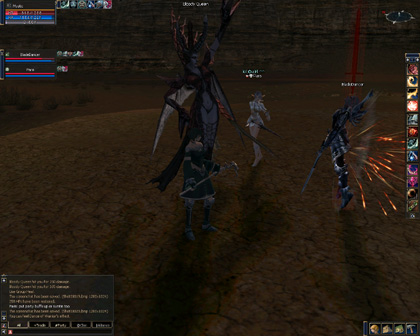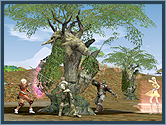| |
|
| Party
Play |
| Lineage
II supports various forms of combat. For each
race, players of almost all classes can hunt
solo or group together to reap the benefits
of larger, more difficult combat. |
 |
 |
 |
| Party-Related
Interface |
Most functions
related to parties are located in the Party
Action section in the Action window and
can be used to form parties with other players.
If using the party matching function, you
can find other players nearby who are of
a similar level to your character. Once
you form a party, you can chat with your
party members exclusively through the party
chat window. Click on the Party tab in the
chat window, or enter # in the chat window,
and then type your message.
After you form a party, underneath your
own HP/MP bar, HP/MP bars of your party
members will appear. You can target a party
member by clicking this bar. Also, if you
double-click a party member's HP/MP bar,
your character will move to the place where
the applicable party member is located.
(This function only works when the other
player is within a certain radius of your
character.)
Also, in the radar located in the upper
right hand corner of the screen, party members
are indicated as green dots. By looking
at the dots, you can easily find the location
of your party members. |
 |
| Party-Related
Rules |
| - |
A party can consist of up to
9 characters |
 |
| - |
Once a party
is formed, whenever the party kills
a monster, each member earns an experience
bonus depending on the number on players
in the party |
 |
| - |
The experience
bonus does not get distributed to any
dead party member. Any experience bonus
allocated to a dead party member will
be lost |
 |
| - |
Party members
can pick up the items gained from party
kills immediately |
 |
| - |
Experience points
do not get distributed to party members who
are too far away from a monster during battle.
Any experience points that are supposed to
go to a distant party member will be lost |
|
 |
| Basic Party
Strategies |
 The better organized
a party, the more efficient the hunt and the greater
payoff to the party members in experience and loot.
Basic party hunting tactics based on characters?
roles are described below. The tactics provided
are only basic strategies as we believe that players
will be able to develop more advanced tactics on
their own.
The better organized
a party, the more efficient the hunt and the greater
payoff to the party members in experience and loot.
Basic party hunting tactics based on characters?
roles are described below. The tactics provided
are only basic strategies as we believe that players
will be able to develop more advanced tactics on
their own.
Leader :
A Lineage II party leader plays the role of directing
the moves of one's party. Party leaders should
have a good grasp of the party's fighting
power and traits, and good judgment to select prey,
and the ability to search for prey in surrounding
area as well as the ability to ensure the safety
of the environment surrounding his/her own party.
Usually the person who first created the party is
the leader. But in some cases, another is selected
as a leader to take advantage of their skills in
swift speed (Elf) and ranged or magical attacks
(Mystic).
Defensive
Role :
The role of a defensive character is to be a "shield?
for the entire party. This role is usually given
to Fighter class characters that have superior defenses.
More specifically, the role is carried out by becoming
a target of monsters?attacks so that other
characters can focus on their attack. For characters
playing this role, it is most important to maintain
one's own HP. It is also important to inflict
damage to a monster continuously so that the monster
will not attack other characters. How well this
role is carried out can help determine how long
a party can continue hunting without a break.
Attack Role :
The role of an attack character is limited to one
task - damaging monsters as much as possible.
This role is most suited to Fighters with powerful
attack skills, Rogues who can inflict a finishing
blow, or Mystics who can use attack magic. Characters
in attack roles (who generally have less defensive)
should be careful to moderate their damage to keep
the monsters aggressive towards the defensive characters.
Recovery Role :
Characters playing recovery roles should focus on
the skills or magic to restore other characters.
Their primary responsibility in a party setting
is a simple one - keep the rest of the party
alive. The most critical key point to a character
playing a recovery role is managing MP to keep plenty
on hand in case of emergency.
Assistant
Role :
Characters playing the role of an assistant are
often those who possess the skills to strengthen
other characters in the party or the skills to weaken
opposing monsters. |
|


